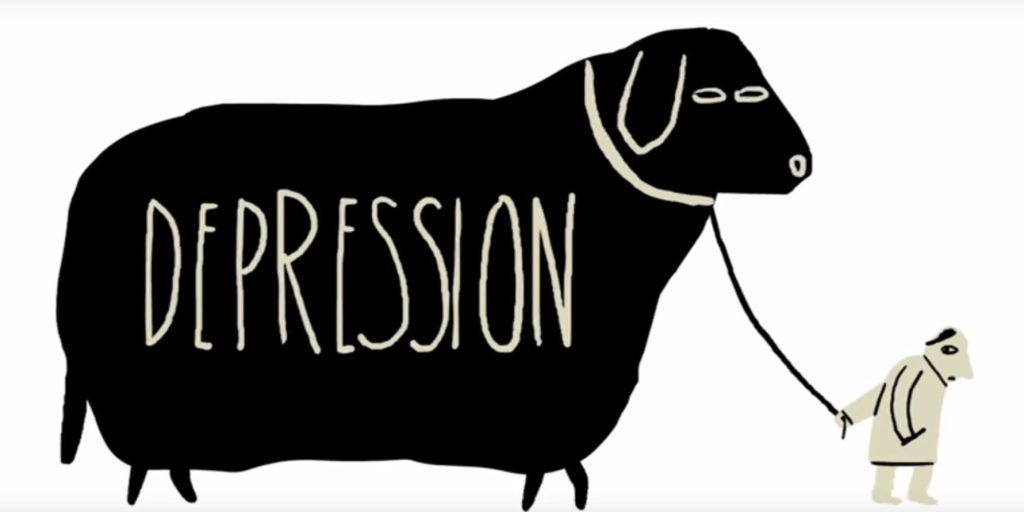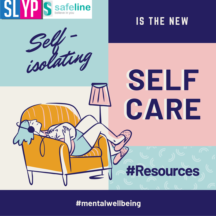Depression and Feeling Low
 Feeling depressed or low can be a result of any number of reasons like losing someone close to you, lack of sleep, stress, bullying etc. but sometimes there can be no reason at all, it’s just a mood you can’t shift.
Feeling depressed or low can be a result of any number of reasons like losing someone close to you, lack of sleep, stress, bullying etc. but sometimes there can be no reason at all, it’s just a mood you can’t shift.
However, feeling down does not always mean you are depressed. If you are feeling down over a longer period of time like a few days or weeks at a time, then it may be a symptom of depression.
Feeling Low
Having a low mood can include things like feeling sad, feeling anxious, worrying, tiredness, having a low-self-esteem, feeling frustrated or angry. These feelings are probably as a result of something that is going on in your life.
It could be:
Problems at home – not getting on with family
Falling out with friends
Lacking self-confidence
Feeling bored
Struggling with school work
Exam stress
Making really small changes can help to lift your mood. You’d be surprised at how changing something about your life can change the way you feel!
Start a new hobby. It can be anything like gaming, playing a sport or musical instrument, baking, dance or even knitting (it’s coming back, trust us!). Switching up your routine and getting interested in things can give you more of a sense of purpose, something to be passionate about as well as something to look forward to. Depending on the thing you take up, you could also meet new people and make new friends.
At the risk of sounding like your parents now…you should sleep more. Sleep is a brilliant thing. When you sleep your body works really hard repairing itself and regenerating cells and it doesn’t get enough time to do this then you feel tired not just physically but mentally and this can affect your mood. Try getting into a routine and get to bed earlier!
You know what they say, “a problem shared is a problem halved”. Just venting an issue or problem can provide you with some relief. It can also help to make you feel as though you aren’t alone. It doesn’t have to be someone who knows you, it could be a teacher at school, a sports coach or a counselor.
When you’re feeling down, it’s easy to focus on the negative. So it helps to try and focus on the things that make you happy however small or silly they may seem. It could be watching your favourite TV programme, chatting to a mate, playing football, dancing and singing around your room like a crazy person or eating ice cream. Write a list of all the things you do that make you feel happy and the next time you feel down get this list out and pick something on there to do.
Depression
If your mood doesn’t shift and you’re not always sure as to why you’re feeling down you may be suffering from depression. Take a look at some of the symptoms below but remember always go and see your GP. Diagnosing yourself online is never a good idea. Your doctor can refer you to the right people to give their professional opinion and help you to find the support you need.
- Having a low mood lasting two weeks or more
- Finding that nothing seems to make you happy
- Feeling hopeless
- Often feeling tired or not having the energy
- Finding it hard to concentrate on everyday things like school work
- Comfort eating or not feeling like eating
- Sleeping or staying in bed more than usual and finding it difficult to get up in the morning
- Having suicidal thoughts or thinking about hurting yourself
These symptoms are by no means exclusive so visit the NHS website for more information.
Understanding Depression
For someone who has not experienced depression it can be difficult to understand. The video below was created by Ted Ed to try to explain what depression is and how it affects the person suffering with it.
What to Do
The first thing to do is to tell your parent or guardian about what you’re feeling and visit your GP with them. Your GP will give you a diagnosis and talk to you about all the options available to you. Some of these are explained briefly below. For more information about the treatments available for depression visit the NHS website.
On first visiting your GP with your symptoms or for mild depression, you may be told to go away and monitor the situation for a period of time. In this instance your GP may ask you to try things like changing your diet, getting exercise or talking to someone.
Talking therapies, can be helpful for anyone suffering with mild or moderate depression. Cognitive behavioural therapy (CBT) is often recommended as a form of talking therapy for those suffering with depression or anxiety.
Antidepressants treat the symptoms of depression. There are a few different types of pills you can take and sometimes it’s about finding the right one for you as one pill doesn’t work for everyone.
Speak with your GP and don’t dismiss anything without considering it first. Talk to your parent or guardian too about it and make sure you have all the facts first.

Cara has spoken publicly about her ongoing battle with depression.
You’re not alone
Nearly 80,000 children and young people and 20% of adults suffer with depression and that’s just in the UK. You should not worry or feel as though you’re the only one. Some people are afraid to talk about mental health but really, it’s so common that everyone should be talking about it. Some famous people suffering with depression have spoken publicly about their experiences to try to break the stigma such as model and actress Cara Delevingne.
You can contact Safeline for support if you or a friend is going through depression and want to speak to someone. We have a dedicated young people’s helpline and we will never judge you for whatever you decide to share with us.
More Information
-
If you are feeling suicidal you can contact Samaritans
Contact Samaritans -
Find out more about depression
Visit the NHS
Image Sources






